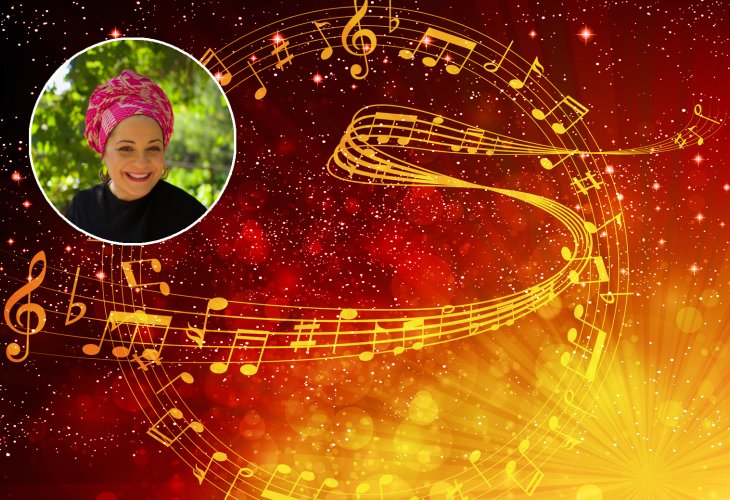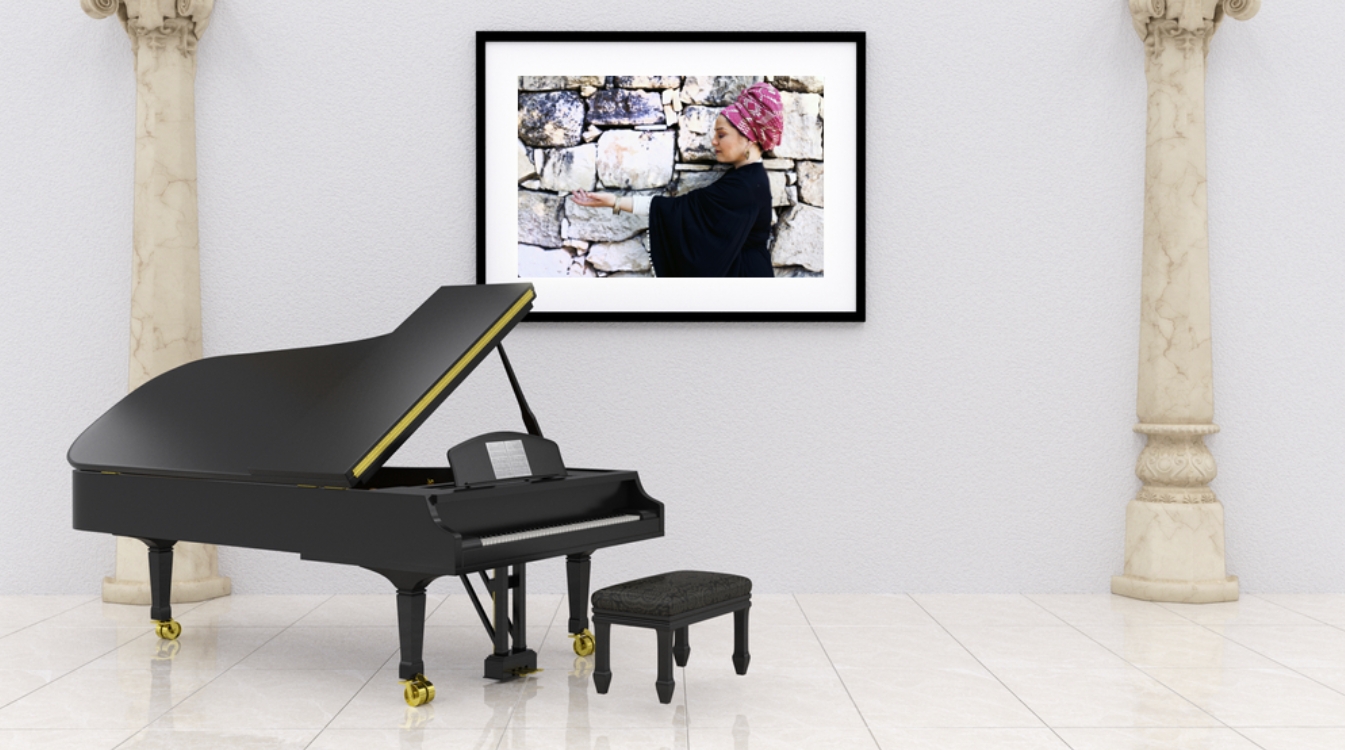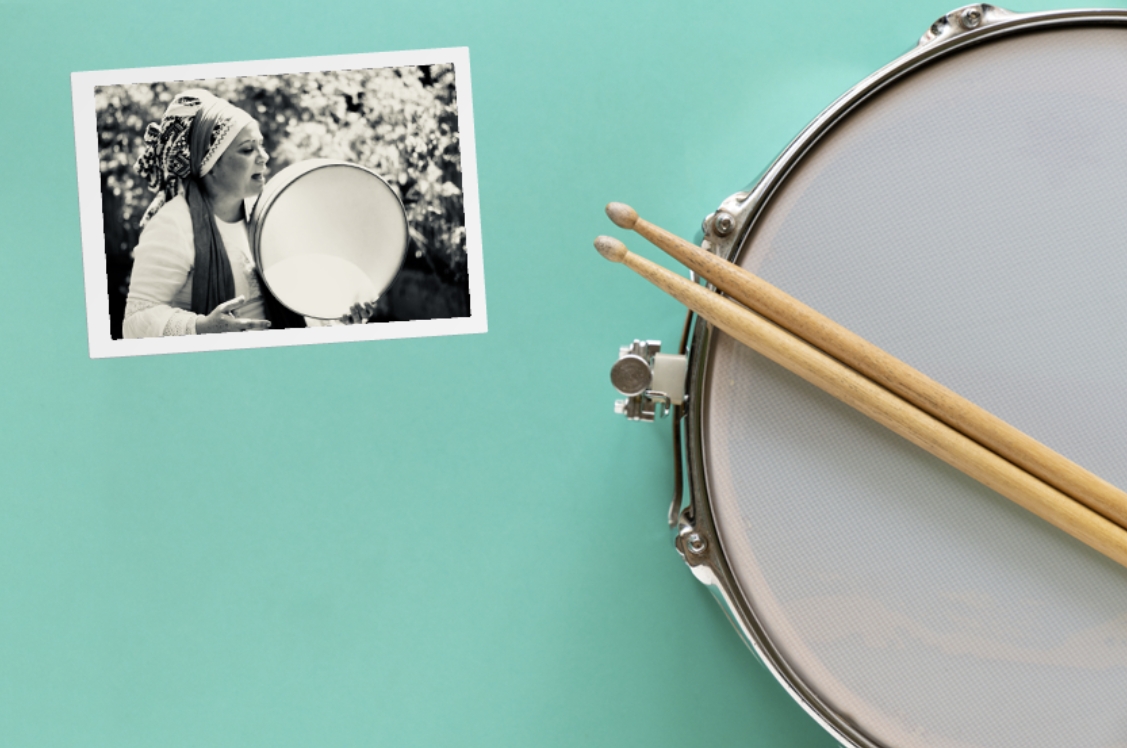For the Woman
Din Din Aviv: The Musical Journey From Childhood Stardom to Spiritual Transformation
How the beloved Israeli singer rebuilt her life through faith, family, and women-only music
 In the circle: Din Din Aviv (Photo: Hila Lipshas)
In the circle: Din Din Aviv (Photo: Hila Lipshas)“Din Din Aviv, married and a mother of four, living in Hod HaSharon. I am a singer for women only, a creator, and a voice teacher.”
The Melody of Judgments
“When I was born, they named me Dina, after my mother’s grandmother. I was a very cute baby, and my mother, who gave birth to me at 19, called me ‘Din Din’ as a sweet nickname — and it stuck. At 16, when I was able to officially change my name, I changed it to Din Din, and it became official.
“When we became religious, several Kabbalists advised me to change my name so I wouldn’t draw negative spiritual forces (dinim) — but I didn’t go along with it. Later I saw in Pirkei Avot the phrase: ‘And the judgment (din) is the judgment of truth.’
“In a way, I got ‘stuck’ with the name Din Din Aviv — but I actually love it deeply. I feel it carries a melody of judgments — compassionate judgments too. And honestly, if we’re talking about dinim, the first person I always judge is myself. I constantly check myself, trying to see where I wasn’t right.”
What My Soul Chose
“I was born to a secular family in Holon, then we moved to Ramat Gan, and later to Ramat Aviv Gimmel. Until eight and a half, I was an only child, and then my brother was born.
“One of my strongest childhood memories is the feeling that I was always very different from those around me. I didn’t go with the flow. My family was very unique — my mother is Moroccan and Greek, my father is Polish, a theater actor and a tap dancer. From a very young age, I was with them on stage for rehearsals, performances, whatever there was.
“I practically grew up inside music, and my parents were my best teachers. I learned piano and ballet, and by age six I participated in a well-known singing competition. At that time I performed four times a day with 16 musicians, in front of thousands of people. I was six but looked like I was four. I wasn’t an amazing singer — just a good voice, nothing extraordinary. Today’s kids on music shows blow me away; I never sang like that.
“There were wonderful things in my childhood, and alongside them, really hard things. A child going on stage at such a young age pays a price. You face ego, jealousy, competition, success, failure — at levels no child should have to deal with. Kids beat me up sometimes because they were jealous. The constant traveling wasn’t easy either. But overall, I’m grateful. Those years gave me confidence — and I also know that this is what my soul chose to experience in this world.”
“In my teens I sang in the Tzofei Tel Aviv youth band. I joined the Air Force band in the army, and after being discharged I enrolled at the Rimon School of Music. At the beginning of my studies, I started learning drums — and that’s how I met Alon, my husband. We both started drum lessons on the exact same day.”
A Spiritual Awakening
“At the brit of our son Eden, Alon started becoming religious. We arranged for a mohel as usual, but the mohel sensed something in Alon and asked him to perform the circumcision himself. The mohel did all the preparation; Alon just did the final action. It turns out it’s not so complicated when guided like that.
“At the time, Alon wasn’t religious at all —we didn’t even fast on Yom Kippur. Sometimes we tried, usually we didn’t. Before the brit, Alon asked someone religious how to prepare, and the man suggested he go to the mikvah and read Tikkun HaKlali. Alon did exactly that and came to the brit radiating light. That’s why the mohel asked him to circumcise Eden.
“The next day, Alon wanted to understand what happened — and that search brought him to full teshuvah.”
Tzitzit In, Jeans Out
“The questions Alon asked, and the answers he found, suddenly changed our lives. He wanted to keep kosher. He drove to Torah classes in the middle of the night. He flew to Uman and came back with a black hat and a kippah underneath. His beard grew, then the side curls. I noticed he wasn’t wearing jeans anymore. I kept throwing jeans into the laundry and saw he wasn’t touching them.
“The tzitzit took a little longer. It happened when we made Eden a chalaka. We bought him tzitzit for the event, and I told Alon — there’s no way Eden wears tzitzit and you don’t. So we bought a pair for Alon, and he hasn’t taken them off since.
“In a way, Eden brought the family back to teshuvah. He’s such a sweet and righteous boy — and also an incredible musician. Flute, drums, keyboard — everything he touches becomes music.”
![(Photo: Hila Lipshas)]() (Photo: Hila Lipshas)
(Photo: Hila Lipshas)
 (Photo: Hila Lipshas)
(Photo: Hila Lipshas)Treasures of Awe
“For four years Alon was deep in teshuvah, and I was absolutely not. He went to shul; I went to the beach. I rebelled, I got angry, I resisted. One rabbi told Alon: ‘Don’t be strict with your wife. She has her own path. She wants the good of your home no less than you do. A woman is the essence of the home. Speak to her only with goodness, and God willing, things will be fine.’
“When Alon told me this, something inside me changed immediately. Understanding the Jewish view — that the woman leads the home, flipped the entire picture for me.
“And beyond that, I saw how much teshuvah improved Alon. He was genuinely happy. He walked around glowing. He had confidence, faith, a sense of purpose. He lived better. All of that made me want it too.
“I also began trusting religious teachers and schools. Their fear of Heaven gave me peace. I felt they would never harm my child. Only when my heart softened toward Judaism could I finally stop resisting.”
Step by Step
“Even with the desire to grow spiritually, my process was very slow. Not simple at all. I wanted authenticity. Not to rush. To listen to myself.
“For example, I’ve covered my hair only for five years. I stopped singing for mixed audiences only two and a half years ago. I realized I must go at a pace that is emotionally and spiritually right for me. “I also felt strongly that we should not move away from Hod HaSharon.
“And through it all, I wanted shalom bayit. I saw how halachah builds peace — how taharat hamishpacha builds longing, excitement, connection. Being joyfully together even without physical touch is not simple — it’s a spiritual practice. A cleansing.
“Torah life is about learning, sobering up, refining yourself. I used to think religion was blindness. Now I understand that it is light.”
 (Photo: Hila Lipshas)
(Photo: Hila Lipshas)Tears of Angels
“With all the goodness that came into my life through teshuvah, there are also very real hardships. Before teshuvah, I was more successful musically. I did bigger things. I received more love, more recognition — and today much less. That’s the painful truth.
“And yet the good is infinitely greater. I cry tears of joy when I look at my husband and children.
“Today, thank God, I choose to make music with holiness and modesty. It has huge benefits. I spend far less time on external appearances and much more on inner work. There’s something liberating in that.
“My music now helps women connect to Hashem. It amazes me. I perform often with Rebbetzin Yemima Mizrachi. My band of female musicians ignites the room — we dance, lift the women up, and they arrive at the shiur full of joy and spiritual energy.”
Let’s Talk About the Good
“Regarding corona, I could complain for hours. I miss performing. My income dropped drastically. I cut back on hobbies, clothes, spending. I’m still figuring out how to navigate this period. I’ve had emotional, physical, and spiritual lows. It’s not easy.
“But I also see tremendous Divine help. Real hashgachah pratit. We managed to stay in our big rental home; the landlord lowered the rent. I received support from musician organizations. And seeing how Am Yisrael embraces each other in crisis — it strengthened me deeply.
“We must focus on the good. There is so much of it. I’m tired of talking about the negative. I want to see good headlines. Look for the good — that’s what heals, grows, and strengthens.”

